|
NOVEMBER 2020
|
|
Dear all!
We are pleased to present you with a very special edition of our newsletter “a message from the future”!
In this third edition, you will find a selection of signals on COVID-19 collected by members of NRC FLIS during the annual meeting on the 8-9 September, with a particular focus on environmental and social aspects. |
COVID-19 & the Environment
|
|
An improvement in air quality, wildlife re-emerging in areas closer to the cities are all signs of environmental improvement induced by reduced human activity. At the same time, they demonstrate the scale of the negative anthropogenic impacts we have on the environment during our “normal” activities. On the other hand, the decline of economic activities could lead to deflecting political and financial capital from environment issues.
Our quick scan for signals and issues emerging linking COVID-19 to the environment showed the following topics:
- A paradigm shift in the construction of knowledge: A new type of knowledge is essential to better understand the complexity of the modern world and find solutions to the economic, social and environmental challenges of our time.
- The double face of plastic: The (important) role of plastic to protect and fight the pandemic is an ambiguous one with an increasing impact on the environment.
- Water and COVID-19: Research will look at the effects of disinfectant loads in water as well as tracking the virus in wastewater for developing early warning systems.
- Air quality and COVID-19: Air quality was considerably improved during the winter and spring months due to the coronavirus.
- Positive impacts on the environment of a society being paused? COVID-19 has had an impact on our lifestyles and how we move around.
- Recovering fauna: Coronavirus has been good for nature recovery according to some initial findings during lock-downs.
|
|
|
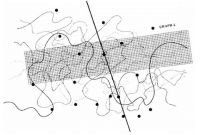
Weak signal: a paradigm shift in the construction of knowledge
Thoughts have emerged on whether today’s societies have the right knowledge (or the right ways of collaborating) in place to understand the “bigger picture” on how the COVID emergency relates to the environment.
(image source: John Cage’s Fontana Mix – notation for experimental music)
|
|
|
|
Et si on cherchait autrement? Plaidoyer pour une science de la durabilité / What if we looked for something else? Advocacy for a science of sustainability
Contemporary research remains fragmented, disciplinary and lacks articulation between the results it proposes and the scope of the problems to be solved. Extinguishing the "COVID-19 fire" through research into treatments and vaccines is essential to save lives... but let's not forget that the rest of the planet is burning! We need to work differently, together, if we are to have a chance of solving environmental crises.
In this context, the recent advent of the "science of sustainability" is a sign of radical change in the construction of new knowledge systems. It is characterised by the fact that its research problems are rooted first and foremost in confrontation with real-world problems, rather than in the dynamics of the scientific disciplines it mobilises.
The aim is to promote transdisciplinary knowledge, co-constructed between scientists and actors in society, whose purpose goes beyond disciplinary interests. This still marginal approach, particularly in France, is essential for a better understanding of the complexity of the modern world and for finding more global solutions to the economic, social and environmental challenges of our societies.
Je koronavírus dobrou správou pre životné prostredie? / Is coronavirus good news for the environment?
There have been reports of environmental improvements during the coronavirus pandemic. But is coronavirus good news, at least for the environment?
Unfortunately, in the long term, this is bad news for ecology and climate change-related problems which will most likely be left to a second level.
Before the coronavirus crisis the climate movement was clearly building up momentum and gaining traction. Civil disobedience movements like Fridays for Future or Extinction Rebellion were all over the news especially in the context of devastating fires in Australia, in the Amazon forest or in California. And within the scientific community, experts were having more ground to share their findings and concerns.
After the health crisis, the economic and social crisis will have to be managed. More resources will be allocated to compensating for losses and lifting up business than to the ecological transition. It will be harder for companies to innovate to a blue market of ecological, organic or fair-trade products that often cost more. In the global market better and "greener" products and services will not win, but those that are cheaper, but less "green".
|
|
|
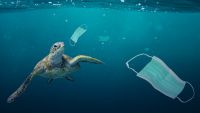
The double face of plastic during the pandemic
Does COVID-19 bring all efforts to live with less plastic to a halt?
Many examples from different countries show that plastic is the number one material when it comes to protect people from the virus. And consequently, masks and gloves are found in many natural environments – as examples reported from various countries show.
(image source: https://unctad.org/news/growing-plastic-pollution-wake-covid-19-how-trade-policy-can-help)
COVID-19 has resurrected single-use plastics – are they back to stay?
This article collects insights from the US on the use of plastic. The authors underline the necessity of regulations around plastic concluding that: “For the longer term, it is unclear how COVID-19 disruptions will affect consumerism and waste disposal practices. In our view, one important takeaway is that while mindful consumers are part of the solution to the plastics crisis, individuals cannot and should not carry the full burden.”
Spain: Coronavirus crisis and plastic waste
Another example from Spain states that “Spanish authorities have been fighting for years to get plastic litter under control. But due to the coronavirus crisis, the little progress they had made in raising awareness among consumers has been reduced to nothing.”
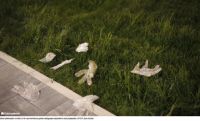
Slovenia: Koronavirus vrača plastiko za enkratno uporabo / Coronavirus brings back disposable plastic
The corona crisis has undermined ambitions to reduce the use of single-use plastics in much of the world. The "emergency" situation is exploited by individuals who again litter as much and where they want, as well as companies that want to sell more of their products.
Morocco: Government raises awareness on safe disposal of used mask
Almost 1 million of protective masks against COVID-19 are used daily in Morocco, where they are mandatory. These potentially infected masks are very often discarded on pavements and other public places. Faced with the health and environmental danger posed by used discarded masks, the Moroccan Ministry of Energy, Mines and the Environment announced a campaign to raise awareness about the safe disposal of used masks. This campaign includes the dissemination of awareness programmes on public and private television channels, radio stations, websites and social networks.
|
|
|
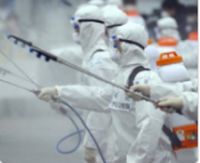
Water & COVID-19
Germany: Das Engelsgesicht der harten Chemie / Disinfectants in wastewater
And what about the impact on the environment? So far, there is hardly any experience with this form of large surface disinfection. "Disinfectants are biocides; they can also kill useful bacteria," says Laura von Vittorelli from the German Federal Association for the Environment and Nature Conservation. Among these useful bacteria are also those that occur in the biological treatment stage of wastewater treatment plants. Disinfectants get to these plants in the wastewater, which means that a rising domestic use of disinfectants can be critical. If the microorganisms in the sewage treatment plants are affected by the disinfectants, more pollutants can enter the surface waters.
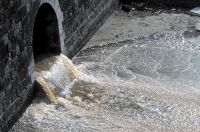
Austria: Coron-A – Nachweis von Corona Viren im Abwasser / Detection and monitoring of SARS-CoV-2 by wastewater analysis
The Coron-A research project will provide site-specific information on the distribution of the coronavirus in Austria. This includes the number of virus particles in wastewater in the catchment area of a wastewater treatment plant. This number corresponds to the number of virus particles excreted by humans via the stool. Wastewater research could be used as an important complement to the results of other studies to monitor the novel coronavirus in the best possible way. Ideally, the research project will provide a tool to detect a possible new outbreak of coronavirus regionally in order to react immediately.
|
|
|
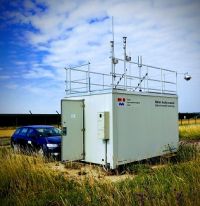
Air quality & COVID-19
Czechia: Změna kvality ovzduší na území České republiky během nouzového stavu / Changes in air quality in the Czech Republic under the state of emergency
The report provides an assessment of ambient NO2 and PM10 concentration measured by the nation-wide ambient air quality monitoring network during the state of emergency from 16 March to 19 April 2020.
The effect of the state of emergency on air quality was assessed as contradictory. On the one hand, a decrease in traffic intensity led to a reduction in emissions from transport-related sources and thus in NO2 concentrations (especially in cities near roads). On the other hand, local heating during the temperature drop in the presence of adverse dispersion contributed to the increase in the concentrations of PM10.
The situation in the Czech Republic was different from the industrial regions of China or Italy, where emissions from industrial enterprises are significantly higher and where the epidemiological situation was much more serious. In the Czech Republic, for example, continuous technological processes in heavy industry in the most polluted region of northern Moravia and Silesia have not changed.
Italy: Qualita dell'aria e COVID-19, c'e bisogno di risposte / Is there link between PM10 and COVID-19?
Different public institutes in Italy have launched a nationwide epidemiological study to assess whether and to what extent air pollution levels are associated with the health effects of the COVID-19.
Air pollution increases the risk of respiratory infections, particularly in vulnerable people, conditions that also characterise the COVID-19 epidemic. The most accredited hypotheses indicate that an increase in PM levels makes the respiratory system more vulnerable to infection and the complications of coronavirus disease. A joint inter-institutional and inter-disciplinary research effort is needed on these issues.
Sweden: Miljön stor vinnare i coronapandemins fotspar
An article from Sweden states that the environment – especially with regards to air pollution, is among the winners of the pandemic.
Malta: Air pollution in Malta falls by up to 70 per cent in just one month
Air pollution levels, especially in nitrogen dioxide and PM2.5 and PM10 particles, have declined dramatically during March with experts pointing to less traffic on the roads as all schools, childcare centres, universities and institutes were closed as part of measures to prevent the spread of the coronavirus. "Measures to control the spread of COVID-19 have de facto decreased traffic flows."
European Data Portal
The European Data Portal reports a COVID-19 related traffic reduction and decreased air pollution in Europe.
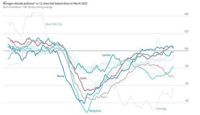
Turkey: Hava kirliligi dünya genelinde pandemi öncesindeki seviyelere geri dönüyor
The initial phase lockdown provided a drop in air pollution while normalising throughout the summer months brought back the pollution increase. The graph represents the NO2 trends generally attributed to traffic activity.
Turkey: Normalleşme nedeniyle Istanbul'da hava kirliligi yüzde 38 artti
News from Istanbul, state that an air pollution decrease during the lockdown period was replaced by an 38% increase in nitrogen dioxide (NO2) pollution during June 2020 following the controlled return to “normal”.
|
|
|
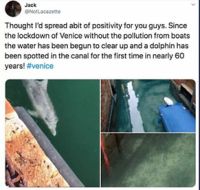
Recovering fauna
Are there signs of an environmental recovery, emissions dropping if societies around the globe are put on “hold”? Beneath the fake news of dolphins appearing in the Lido of Venice, the group collected more serious reports from their countries – often underlining positive impacts on air quality and the reappearence of wildlife.
Malta: Increase in local fauna sightings during the COVID-19 pandemic
Ever since Malta went into partial lockdown, animals such as dolphins, turtles, and birds have been spotted more frequently than in previous years.
A decrease in anthropogenic pressures has influenced the environment for the better. Nonetheless, the most reasonable explanation appears to be that rather than the things around us changing, it is instead our perception that has changed. We have become more attentive to our environment, and all that thrives in it.
India: Sounds of birds replace noise pollution in Kolkata
The sight and sounds of birds replaced car horns and many other sources of noise pollution in Kolkata, amid the nationwide lockdown to curb the spread of the novel coronavirus disease.
Germany: The coronavirus curfew gives wildlife a rare break from environmental pollution.
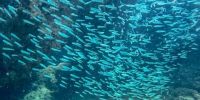
Antalya-Turkey: Pandemi dogaya yaradi. Yavru balik sayisi 2 kat artti
Nature benefited by the pandemic. Number of fish fry has doubled compared to the previous years.
Canada: Increase of wildlife sightings reported during COVID-19 lockdowns
There has been an uptick in sightings of common urban species such as skunks, raccoons, white-tailed deer, rabbits and foxes in the greater Montreal area since the pandemic began.
|
|
|
|
But...
This collection of positive indications is accompanied by a series of question marks:
One of the tasks of this group collecting evidence and signals from all over Europe (and beyond) might feed into the answers to these long term questions!
|
Social implications of COVID-19
|
|
La covid, un accélérateur de la démétropolisaton? /Demetropilisation, a new trend break?
According to the Best Agents / Les Echos real estate price index, housing prices in France have tended to stagnate since March 2020 in Paris, Lille, Toulouse and Lyon. To many this situation obviously results from the health and economic crisis, and is therefore at least partly cyclical. But could it also be more structural, and therefore prefigure a lasting challenge to metropolitanisation? The current crisis could in fact accelerate certain trends that have been at work for several years and disrupt the distribution of the population across the territory.
Towards a lasting dissociation between living places and economic cores?
One of the historical dynamics of metropolisation is the concentration of economic activities and workers on the same territory. But the spread of telework as a regular and massive practice could allow workers who practice it to move away from their company's headquarters. And therefore theoretically to reside in another city, or even another region.
The crisis has also led to an acceleration of the dematerialisation of access to certain public services, but also of e-commerce. Residing close to shops and administrative services could become less of a determining factor for some households if equivalent offers are available online. And this trend concerns both the active and the inactive, who, it should be remembered, make up the majority of the French population.
The growing importance of quality of life
While nearly half of all housing in France is in the form of apartments, the period of confinement has increased the desire for more space in the home, but also for a more pleasant living environment.
The exceptional case of the Paris region
It is of course in Paris that the impact of the COVID crisis on real estate could be the most important. According to INSEE, 450,000 Parisians left their main residence during the confinement. In the survey of the Forum vies mobiles, during the confinement, nearly 40% of the inhabitants of the Parisian agglomeration declared that they wanted to move.
According to the Seloger site barometer, property prices in Paris fell by 4.2% in the second quarter of 2020.
Real estate agencies have even been set up to help Parisians settle in the provinces. This is the case of the Paris je te quitte agency, which helps its clients choose the ideal city, find a job and a place to live.
|
|
|
|
Do-it-Yourself!
Did COVID-19 change us all into homewokers? Is DIY culture growing?
Here are the insights from a Market Analysis.
|
|
|
| Changing mobility habits?
Various signals show that COVID-19 had indeed an impact on how we move around.
Germany: Aktionstag Pop-Up-Radspuren» für mehr Radwege in Berlin / Pop-up cycle roads
The Netherlands: De lockdown deed ons fietsen als nooit tevoren. Wordt de drukte op de fietspaden vanaf juni onhoudbaar? / COVID made us cycle like never before
|
|
|
| Social Justice?
COVID-19 and the increase of social inequality.
Five things that COVID-19 has thought us about inequality
On the COVID-19 grassroots justice fund
COVID-19 – a springboard for more food solidarity?
|
Information about the project: Growing the collection together!
|
|
We are a team of curious, good looking:-), future-minded NRC FLIS horizon scanners, who scan the horizon to learn from the process and from each other.
We collect signals according to 3 guiding questions:
- How does COVID-19 change our societies and how do these changes impact the environment?
- Can we observe a bottom-up «Green Shift» in European societies?
- What is going on that could be a hint for a new mega topic and might be important for FLIS members to know?
We have a lot of fun collecting signals together and hope the information we collect can be useful too. For example, by finding its way into future reports and processes, such as the EU foresight system for the identification of emerging environmental issues (FORENV).
Have a look at what we have collected so far on Pearltrees, our virtual pin board! Help! Pomozte nám! Ajudem-nos! Segíts nekünk! Hilfe! Aidez nous! Bize yardim et!
We would greatly appreciate your help in making our collection of interesting signals and bottom-up projects and initiatives addressing sustainability challenges grow!
Warm wishes from Ana, Anne, Florian, Karin, Klaus, Miklós, Sylvie, Tereza & Teoman (NRC FLIS)
|
|









